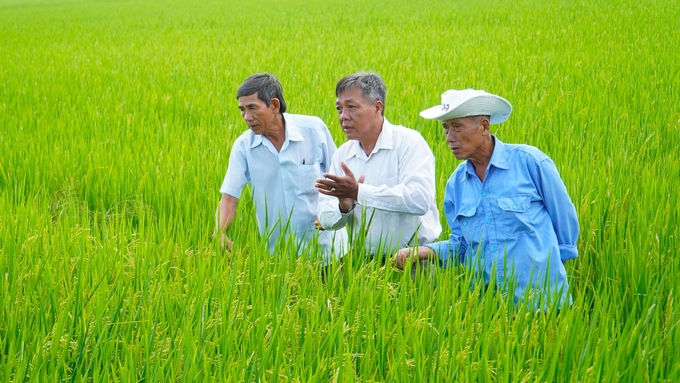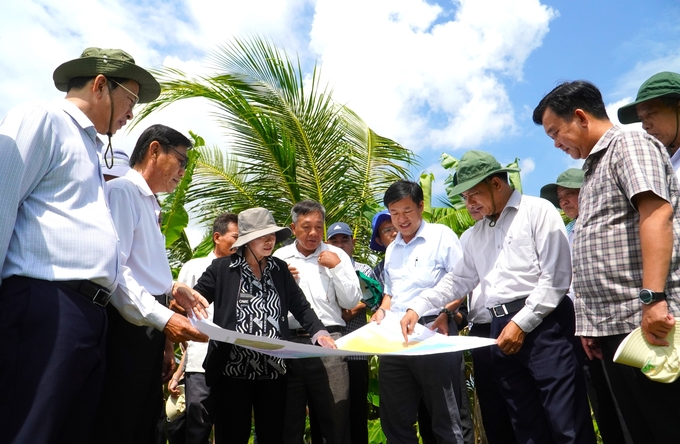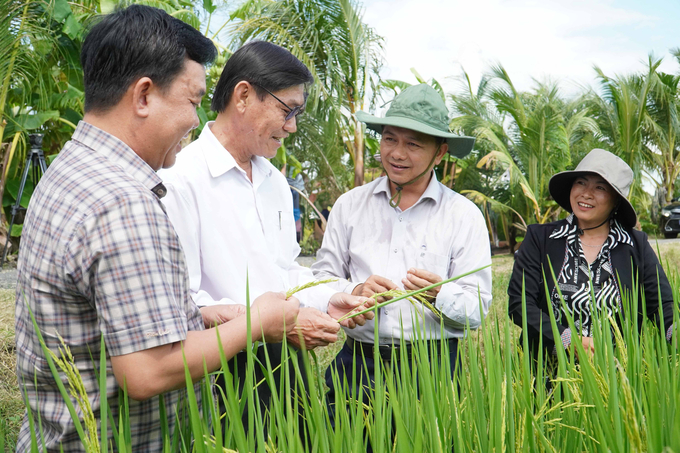November 24, 2025 | 06:04 GMT +7
November 24, 2025 | 06:04 GMT +7
Hotline: 0913.378.918
November 24, 2025 | 06:04 GMT +7
Hotline: 0913.378.918
Soc Trang is the second locality in the Mekong Delta region to implement a pilot emission reduction field, the Project for Sustainable Development of 1 million hectares of high-quality and low-emission rice cultivation associated with green growth in the Mekong Delta region by 2030 (referred to as the Project for 1 million hectares of high-quality rice).
The field is deployed on a scale of 50 hectares at Hung Loi Agricultural Cooperative (Long Duc commune, Long Phu district). The ST25 rice variety was selected for sowing from May 20 to 24, 2024, in the form of row sowing (border rows and regular rows), cluster sowing with fertilization according to the process of the Department of Crop Production (Ministry of Agriculture and Rural Development).

The emission reduction field under the 1 million-hectare high-quality rice project in Soc Trang is being implemented continuously in 3 crops: summer-autumn 2024, winter-spring 2024-2025, and summer-autumn 2025. Photo: Van Vu.
The International Rice Research Institute (IRRI) supports 50% of seeds; MTK Fertilizer Company supports 50% of fertilizer; Tu Sang Enterprise supports mechanized sowing and planting, combined with burying fertilizer; Saty Company supports water level sensors through the "Trung mua" application to monitor water levels on mobile phones.
The National Agricultural Extension Center, Institute of Agricultural Environment (Vietnam Academy of Agricultural Sciences) organized 2 training courses, providing guidance on high-quality rice cultivation techniques and reducing emissions for cooperative members participating in the model and, at the same time, giving guidance on measuring, reporting, and assessing greenhouse gas emissions (MRV) for agricultural extension workers and crop and plant protection staff.
The timely implementation of the 1 million hectares of high-quality rice project is a condition for farmers in the Mekong Delta in general and Soc Trang province in particular to access and apply new techniques in production, contributing to limiting environmental pollution, applying mechanization, reducing production costs, and facilitating product consumption linkages.

Soc Trang provincial leaders survey where the 1 million-hectare high-quality rice project is being implemented in Long Phu district. Photo: Kim Anh.
The initial implementation of the emission reduction field at Hung Loi Agricultural Cooperative has revealed some limitations. However, the rice has grown well up to this point, and the members are extremely excited, waiting for the final harvest results.
From 2024 to 2025, Long Phu district will implement a 1 million-hectare high-quality rice project in Long Phu, Tan Hung, Long Duc communes, and Long Phu town, with a total area of 4,000 hectares. From 2026 to 2030, it will be expanded to 9 communes and towns in the district with a total area of 8,150 hectares.
Recently, through a field inspection of the progress of the Project, Mr. Tran Van Lau, Chairman of the People's Committee of Soc Trang province, said that the investment in the model up to this point can be confirmed as successful if not affected by the weather.
Mr. Lau also highly appreciated the systematic organization of the provincial agricultural sector and related professional agencies.
In the coming time, to implement the Project, the leaders of Soc Trang province requested that the Department of Agriculture and Rural Development and localities in the province pay attention to the production organization stage. Carefully review the planting areas associated with planning the region, province, and district to avoid conflicts with other planning.

Mr. Tran Van Lau, Chairman of the People's Committee of Soc Trang province, suggested that the Department of Agriculture and Rural Development should pay attention to the production organization in the Project of 1 million hectares of high-quality rice systematically, professionally and modernly. Photo: Kim Anh.
At the same time, the agricultural sector needs to pay attention to investing in irrigation and transport infrastructure and increasing technical staff to support farmers, cooperatives, and cooperative groups in implementing the Project and aiming to research and invest in models of machinery and technology to measure emission reduction.
According to Mr. Lau, implementing the Government's 1 million hectares of high-quality rice project, the People's Committee of Soc Trang province has planned to deploy it simultaneously in 9 districts, towns, and cities (except Cu Lao Dung district and Vinh Chau town).
Currently, the Project is in the phase of implementing pilot models. There are no policies or regimes for widespread implementation. Mr. Lau highly appreciated the caution of the Ministry of Agriculture and Rural Development because, through the pilot models, relevant units will summarize, draw experience, and evaluate effectiveness. From there, propose appropriate policies that are close to reality, slowly but surely.
Through the emission reduction field model at Hung Loi Agricultural Cooperative, the Chairman of the People's Committee of Soc Trang province proposed that localities build at least 1-3 pilot models at the district level. From there, compare the effectiveness between high-quality, specialized rice cultivation and traditional rice cultivation to find solutions and production orientation for farmers...
Translated by Huong Giang
/2025/11/22/4018-4-213342_747.jpg)
(VAN) The Mekong Delta Agricultural Experts Club has attracted 143 experts and researchers to participate in providing consultancy and contributing initiatives to the development of one million hectares of high-quality rice.

(VAN) Ca Mau’s development of OCOP products opens a path to increasing cooperatives value, helping boost income, expand markets, and affirm collective economy's role.

(VAN) Turning seemingly ordinary coconut shells into unique jewelry and artwork, Nguyen Bang Nhi spreads the value of local culture through her brand, Cocohand.

(VAN) Results from the Sustainable Durian Model Project in Dak Lak have confirmed the critical role of Yara Viet Nam in transferring advanced nutritional solutions to farmers.

(VAN) In Tuyen Quang province, livestock farmers have introduced effective models and innovative practices that significantly strengthen African Swine Fever prevention and control efforts.

(VAN) This is the study conducted by IRRI and Can Tho University on the rice straw value chain in Mekong Delta showing an economic potential of more than 6.6 trillion VND/year.

(VAN) By participating in cooperative economics, many farmers in Tay Ninh have overcome hardship, mastered clean dragon fruit cultivation techniques.